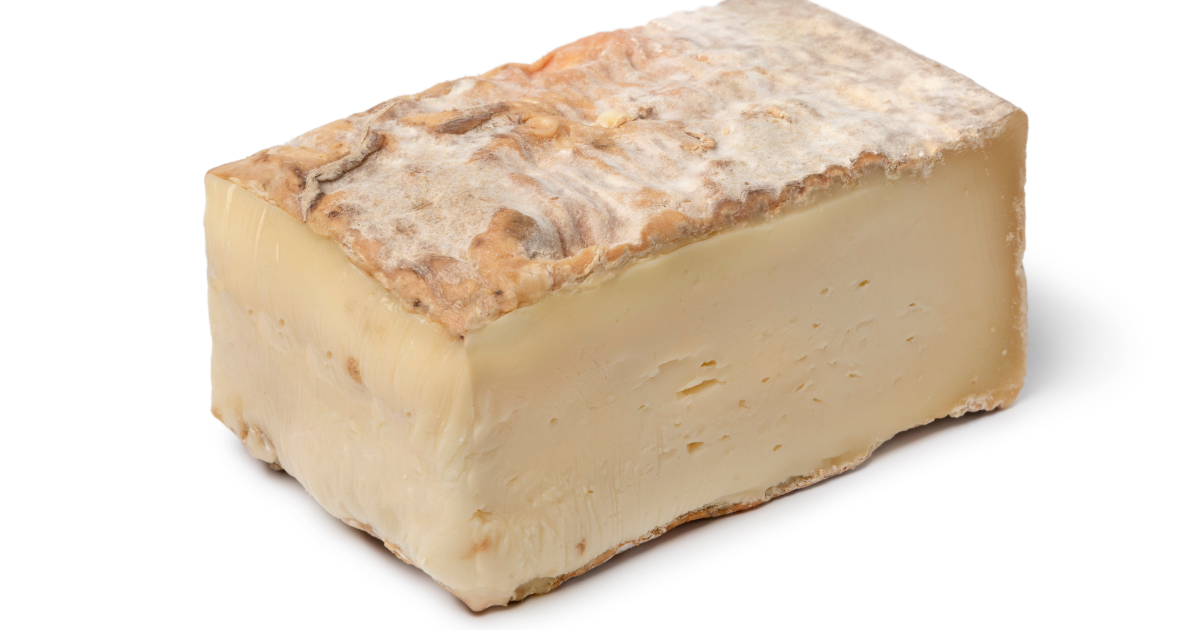Gubbeen is a wonderful semi-soft, washed rind cheese from County Cork in Ireland.

With its pinkish rind and smooth, creamy paste, Gubbeen offers a meaty, nutty flavor with mushroom and grassy notes.
This unique cheese has won many fans. But what if you can't get your hands on some Gubbeen? Not to worry - plenty of alternatives can sub in nicely.
Why Substitute for Gubbeen Cheese?
There are a few reasons you may need a stand-in for Gubbeen:
- Availability: Gubbeen is produced on a small scale in Ireland, so it can be hard to source in some areas.
- Cost: As a speciality artisanal cheese, Gubbeen fetches a higher price tag. Alternatives offer a more budget-friendly option.
- Personal preference: While delicious, Gubbeen's robust flavor may be too strong for some palates. Milder swaps allow customization.
- Dietary needs: Gubbeen contains dairy, unsuitable for vegans/lactose-intolerant. Substitutes like plant-based or lactose-free choices accommodate dietary needs.
Key Takeaway: From availability to cost and preference, valid reasons abound for replacing Gubbeen cheese in recipes or on cheese boards.
Mild & Creamy Cheeses
For those favoring gentler flavors, start with mild and creamy alternatives:
- Havarti: From Denmark, Havarti offers a smooth, semi-soft texture and buttery aroma just like Gubbeen. Its mild, slightly tangy taste also makes it a prime contender.
- Fontina: This Italian semi-soft, pasty cheese provides a mild nutty flavor with fruity notes, similar to young Gubbean. Great for cooking too thanks to its meltability.
- Muenster: With French roots and an American following, Muenster has a soft, smooth texture and mild tang with buttery hints. Its rind helps mimic Gubbeen as well.
- Monterey Jack: Another good melter like Fontina, peppery Jack from California has a supple body and mildly tangy flavor with traces of butter.
- Gouda: This Dutch cheese exists along a wide spectrum, with young goudas offering a mildly sweet, creamy base not far off from Gubbeen. Some aged goudas grow more robust too.
- Mozzarella: Fresh mozzarella specifically carries an milky, tangy flavor plus soft, moist quality making it a reasonable fresh cheese alternative.
- Queso Blanco: Translating to "white cheese", this smooth Latin American cheese offers a mild, slightly salty base mingling well with other ingredients.
Key Takeaway: Havarti, Fontina, Muenster and other mild, creamy cheeses substitute nicely for Gubbeen based on comparable textures and gentler flavors.
Semi-Soft to Semi-Hard Cheeses
Prefer more structure but not too bold a presence? Try these semi-soft to semi-hard alternatives:
- Port Salut: Hailing from France, this supple, straw-colored cheese gives off fruity, buttery notes mingling well with other flavors.
- Edam: This Dutch export (those red wax coatings!) carries an aged flavor profile echoing earthier Gubbeen notes. Expect a firmer texture and hints of hazelnuts too.
- Colby Jack: Basically, a peppery collision between cheddar and Monterey Jack, this American mixed-milk cheese balances subtle tang and cream.
- Provolone: Ranging from mild to sharp, this Italian stretched curd cheese often offers nutty, fermented fruit flavors with occasional smoky hints found in Gubbeen too.
- Colby: Taste and texture-wise, this Wisconsin original lives between cheddar and Jack. Thus, it retains a supple, creamy body with light tang.
- Gruyère: Famed for fondue, this Alpine cheese shares hints of fruit and nuts with Gubbeen. Coupled with a dense texture, it makes melting magic.
Key Takeaway: Semi-soft to semi-hard cheeses like Port Salut, Edam, Colby Jack and more sport fuller bodies and bolder (but not overpowering) flavors suitable for Gubbeen substitution.
Pungent, Robust Alternatives
If you like ‘em stinky, go for washed rinds, blues or others with some punch:
- Chaumes: This French washed rind pairs an aromatic rind with a springy interior carrying herbaceous and nutty hints to echo Gubbeen.
- Taleggio: Another washed/smear-ripened choice, this Italian softie flaunts an orange crust wrapping a rich, meaty interior with fruity kicks.
- Limburger: Infamously stinky, this soft Belgian cheese oozes a creamy interior amid yeasty, nutty notes lying in Gubbeen’s wheelhouse. Approach with an open mind!
- Roquefort: An elite blue cheese, France's king of mold offers a crumbly yet creamy body with spicy, sweet contrasts. Strong stuff but a solid swap.
- Stilton: England's beloved blue made from cow, sheep and goat's milk exudes a mellow, nutty presence only punctuated by blue veins.
- Gorgonzola Dolce: On the milder blue spectrum, this Italian cow's milk cheese carries a supple, sweet profile with mere crumbles of blue and occasional fruitiness.
Key Takeaway: Washed rinds like Chaumes, punchy blues including Roquefort/Stilton or tamer Gorgonzola Dolce suit daring dairy lovers. Their assertive qualities align with Gubbeen.
Plant-Based Cheese Options
Vegans, lactose-intolerant and health-conscious eaters need not miss out. Nut-based or fermented plant offerings bring the flavor without the dairy:
- Miyoko's Creamery: Expertly mimicking European styles, these cashew nut-milk cheeses offer washed rinds, pepper jack, bloomy rinds and French-style triangles with melty properties.
- Kite Hill: Known for soft, spreadable textures, these almond milk cheeses supply rave-worthy cream cheese, ricotta and soft-ripened options. More aged varieties continue developing too.
- Treeline: Cultured cashew and macadamia soft cheeses take on Camembert, cheddar and herb/pepper jack profiles. Great melting properties too.
- Vromage: Made from various nuts and veggies, Vromage covers goat, cheddar, Camembert and even blue cheese alternatives. Most carry creamy consistencies with accurate flavors.
- Field Roast Chao Slices: While not as gourmet as smaller producers, these coconut oil-based shreds and slices deliver on everyday melting/easy snacking needs.
- Daiya: Perhaps the most widely available commercial brand, Daiya fashions plant-based cheddar, havarti, Gouda and mozzarella-style shreds, blocks and slices.
Key Takeaway: Incredible artisanal as well as convenient store-bought plant-based cheeses mimic cheeses like Gubbeen exceptionally well, catering to specialty diets.
Tips for Finding the Perfect Substitute
While touches and textures vary across the spectrum, keep these pointers in mind when Gubbeen substituting:
- Match the format: Is it crumbling over a salad? Melting on a sandwich? Mind intended use.
- Consider age: Young, mild Gubbeen resembles bloomy rinds like Brie. Aged versions parallel washed rinds.
- Determine strength: Delicate flavors? Robust kick? Pin down intensity to guide swapping.
- Read the label: Cow's milk cheeses align most closely. But goat, sheep or plant-bases work too.
- Ask for tastes: When exploring alternatives at the cheesemonger, never hesitate to ask for a sample.
- Give new options a fair chance: Step outside comfort zones to uncover surprising substitutes!
Key Takeaway: Keeping uses, age, strength, ingredients and an open mind in focus helps determine ideal substitutes when Gubbeen cheese is unavailable or unsuitable.
FAQs
What is the closest cheese to Gubbeen?
Due to its comparable washed rind and semi-soft properties, Chaumes makes the closest direct substitute for Gubbeen cheese. Its nutty, herbaceous flavors contain similar complexity too. Young goudas also mimic some of Gubbeen's mild, sweet qualities while Muenster wins points for texture.
Can I replace Gubbeen with cheddar?
Although everyday cheddar differs greatly from speciality Gubbeen, they share subtle fruitiness when allowed to age. For cooking applications especially, sharp aged cheddar offers a reasonably robust alternative in textures from crumbly to creamy. But flavor dimensions fall short of Gubbeen’s complexity.
What cheese is similar to Gubbeen for cheese boards?
For showcasing, opt for cheeses carrying visual appeal and intrigue alongside flavor range. Great substitutions include Stilton (iconic blue veining), Treeline (pyramid shapes), Taleggio (smeared orange rind), Gruyère (hard, nutty) or Vromage’s camelbert (gooey, herb crusted).
Is there a vegan alternative to Gubbeen?
For plant-based applications, Miyoko’s Creamery presents the best store-bought vegan substitute thanks to its specialized washed rind and aged cheese options made from cashew milk. But other producers like Kite Hill (soft cheeses), Treeline (aged styles), Vromage (blue alternatives) or Field Roast Chao (melty slices) deserve recognition for their spot-on replicas too.
Conclusion
Don't be afraid to experiment with different Gubbeen substitutes in your cooking, cheese boards and snacking.
You might just discover a new favorite.

